Key takeaways
- Republican campaigns thrive by connecting with community values and utilizing both traditional and digital engagement strategies.
- Local party officials play a crucial role in translating community concerns into actionable campaign strategies and nurturing year-round relationships.
- Effective networking relies on genuine relationships, active listening, and consistent communication to maintain political connections.
- Preparing for meetings with research and clear goals enhances the effectiveness and authenticity of interactions with local officials.
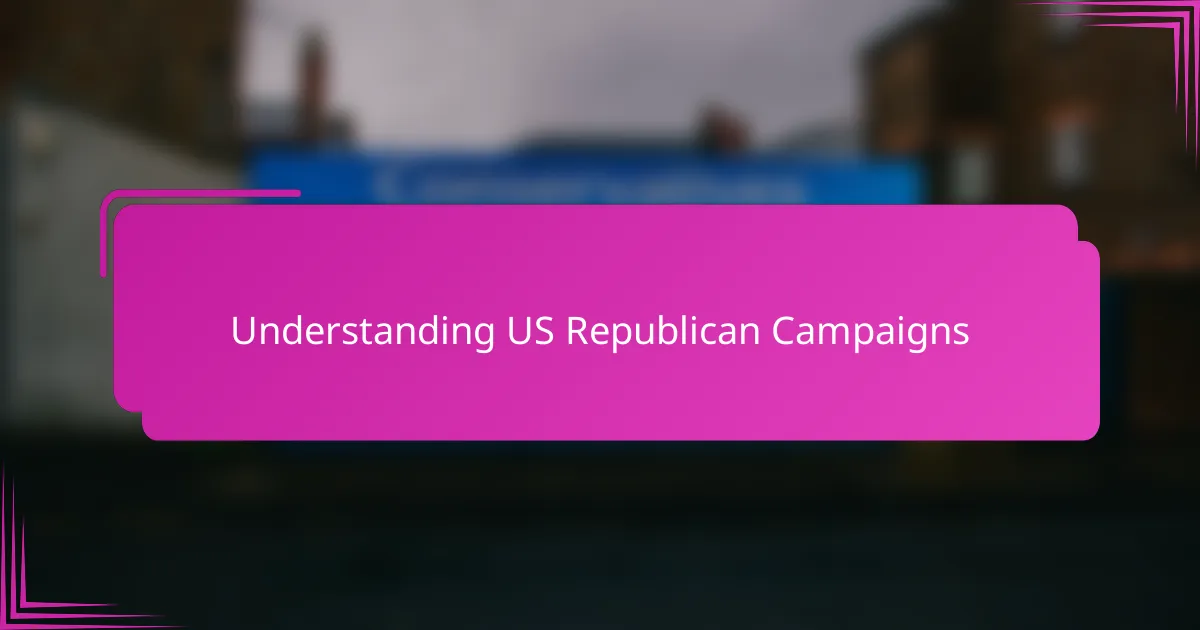
Understanding US Republican Campaigns
Understanding US Republican campaigns means delving into a world where grassroots energy meets strategic messaging. I remember attending a local rally where the passion was palpable—people weren’t just voters; they were active participants in shaping the party’s future. Have you ever wondered what drives that level of commitment?
Campaigns often hinge on connecting deeply with the community’s values and concerns. From my experience, Republican campaigns excel by tapping into local traditions and conservative principles, creating a sense of shared identity that resonates beyond policy points. It’s fascinating how these campaigns balance national narratives with personal stories to build trust.
What really struck me is how these campaigns manage to stay adaptive, blending traditional door-to-door engagement with smart use of social media. They understand that modern politics demands both a firm handshake and a timely tweet. This dual approach keeps the message relevant and the supporters energized.
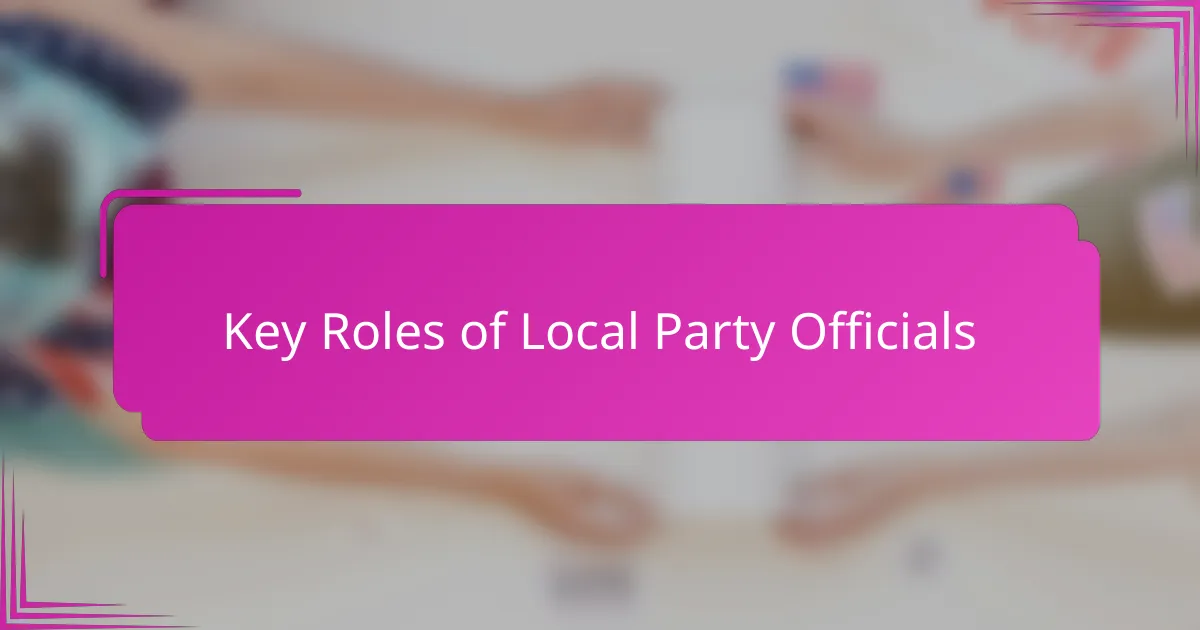
Key Roles of Local Party Officials
Local party officials play a pivotal role in the Republican campaign ecosystem, acting as the vital link between candidates and everyday voters. From my own experience, these officials are often the first to identify community concerns and translate them into actionable campaign strategies. Have you ever met someone who seemed to know everyone in town? That’s usually a local party official, building networks and trust piece by piece.
Their responsibilities go beyond organizing events; they coordinate volunteers, manage voter outreach efforts, and keep the campaign grounded in local values. I recall a meeting where a county chair’s insight into the community’s priorities reshaped our entire messaging approach. It’s this grassroots knowledge that often makes or breaks a campaign.
What impresses me most is their commitment to sustained engagement, not just election season hustle. They nurture relationships year-round, ensuring that when the time comes, turnout is high and enthusiasm is genuine. Isn’t that the kind of dedication we hope for in political leadership?
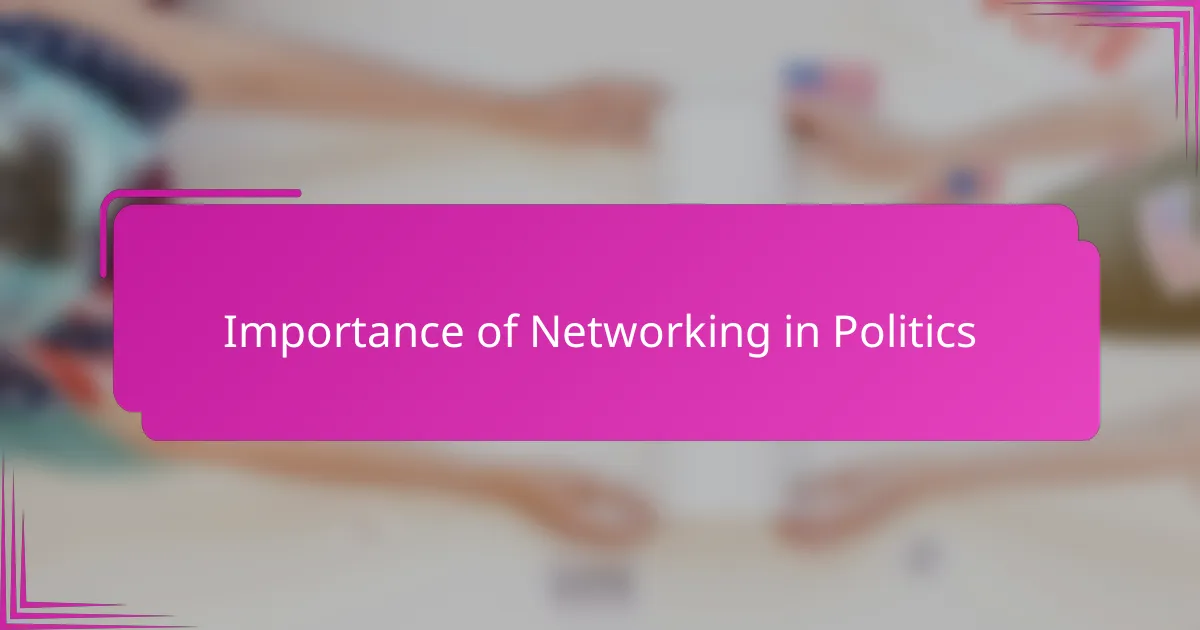
Importance of Networking in Politics
Networking in politics is more than just exchanging business cards—it’s about building genuine relationships that withstand the pressures of a campaign. I recall a time when a casual conversation with a local official opened doors to community leaders I hadn’t met before, proving that trust often begins with simple, sincere connections.
Why does networking matter so much in politics? From my experience, it turns strangers into allies who share information, resources, and support, making the whole campaign machinery run smoother. These bonds create a sense of teamwork that energizes everyone involved, especially when the stakes are high.
What stands out to me is how networking creates a feedback loop, helping candidates stay attuned to the community’s evolving needs. Without these personal ties, campaigns risk becoming out of touch, but through constant dialogue and collaboration, they remain relevant and responsive.
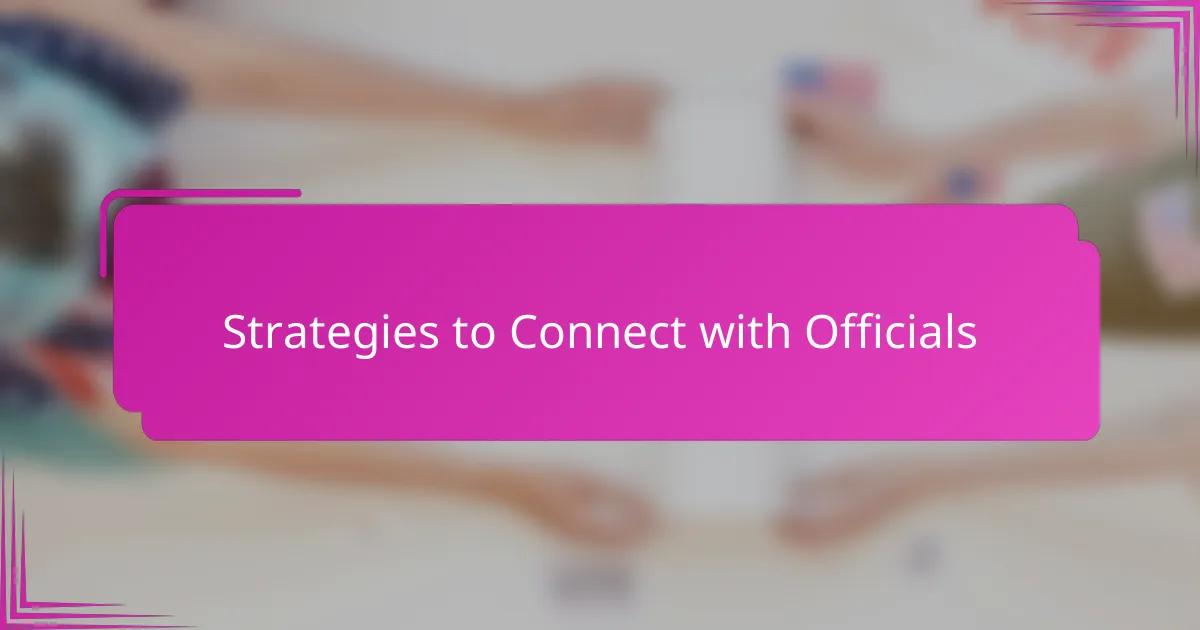
Strategies to Connect with Officials
One of the strategies I found most effective was showing up consistently to local meetings and events—not just during campaign season, but year-round. I noticed that officials appreciate when you’re part of the community fabric, not just a visitor looking for favors. Have you ever experienced how just being present can open doors? It really does.
Another approach that worked well for me was asking thoughtful questions that showed I cared about their challenges, not just my own agenda. By genuinely listening and acknowledging their insights, I built trust that felt natural rather than forced. It’s amazing how a simple conversation, focused on their perspective, can turn a formal introduction into a meaningful connection.
I also learned to follow up regularly, whether it was a brief email or a quick check-in call. This steady communication helped me stay on their radar without overwhelming them. From what I’ve seen, officials are more likely to engage when they feel remembered and valued over time, not just contacted out of the blue. Have you tried this in your own networking efforts? It makes all the difference.
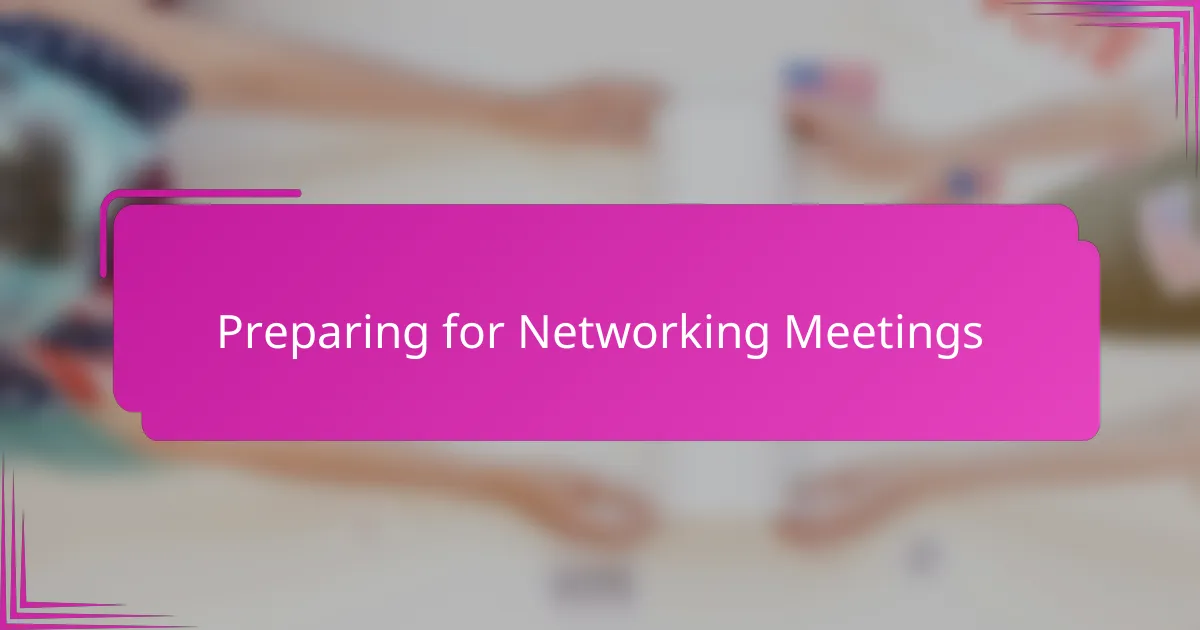
Preparing for Networking Meetings
Preparing for networking meetings means more than just marking your calendar; it’s about doing your homework. I always start by researching the officials I’m meeting—understanding their roles, priorities, and recent initiatives. Have you ever walked into a meeting feeling caught off guard? That’s a sure way to miss opportunities.
I also find it helpful to set clear goals for each meeting. What do I hope to learn or offer? Having a mental checklist keeps the conversation focused and meaningful. Sometimes, a simple question tailored to their local concerns opens doors I didn’t expect.
Lastly, I like to prepare a few talking points that connect my campaign message to the official’s interests. It feels more authentic when you relate on shared values rather than just reciting a script. Have you noticed how genuine connections beat rehearsed speeches every time? I know I have.

Successful Networking Experiences
One of my most memorable networking successes happened at a small county meeting where I made the effort to listen closely rather than just talk. An official shared local concerns that hadn’t come up in broader conversations, and that moment of genuine attention led to ongoing collaboration. Have you ever noticed how people respond when they feel truly heard? It’s a game changer.
Another time, following a casual introduction at a community event, I stayed in touch with a local party leader through brief but consistent messages. Over weeks, this simple habit built a bridge of trust, opening doors to volunteer networks that were otherwise hard to access. The key, I realized, was patience and persistence—not just speed.
What strikes me most about these experiences is the natural flow from acquaintance to ally, rooted in respect and shared purpose. Networking isn’t just a strategy; it’s about weaving relationships that carry a campaign forward, especially when challenges arise. Have you ever found that a single strong connection made all the difference in your political efforts? For me, it happens more often than I expected.
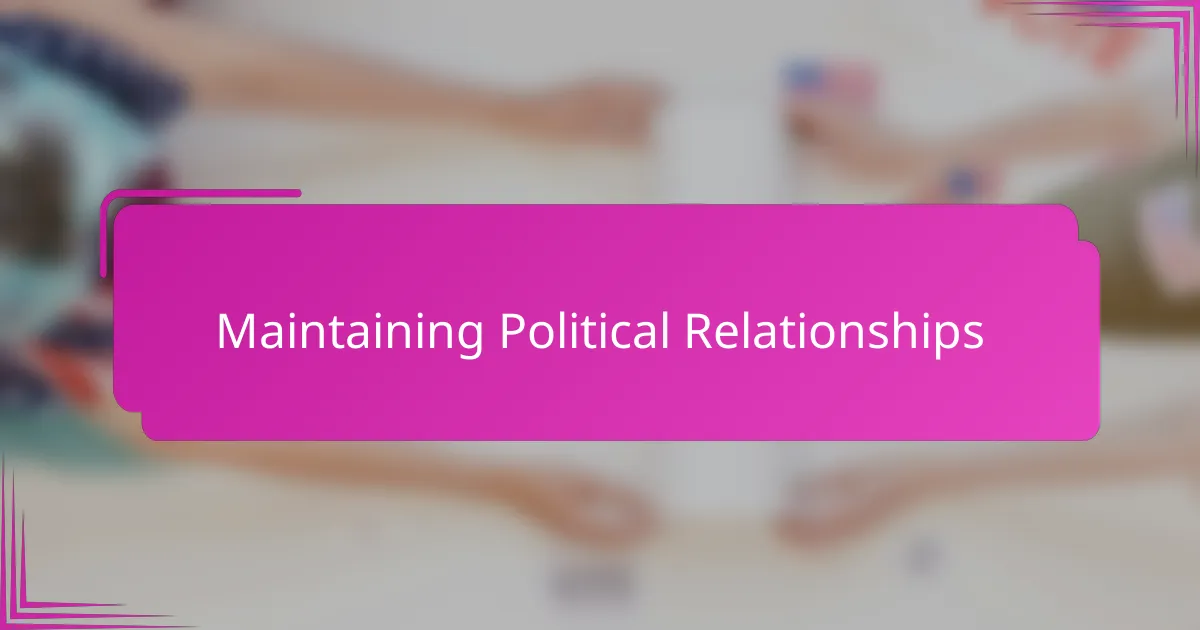
Maintaining Political Relationships
Maintaining political relationships requires patience and genuine attention. I’ve learned that consistent check-ins, even outside of campaign season, signal that you value the connection beyond convenience. Have you ever reached out just to say thank you or ask about their latest initiatives? Those small gestures often keep the door open for meaningful collaboration.
Another thing I noticed is how openly sharing updates and listening to concerns reinforces trust. When I make it a habit to provide timely information or seek feedback, it feels like a two-way street rather than a transactional exchange. Isn’t it more rewarding when relationships evolve naturally, rather than feeling like obligations?
Lastly, celebrating wins together—no matter how small—helps strengthen bonds. I remember sending a quick congratulations email after a local official secured a community project. That simple act deepened our rapport and reminded me how political relationships thrive on sincere recognition and shared progress. Have you experienced how acknowledging others’ successes can create lasting goodwill?